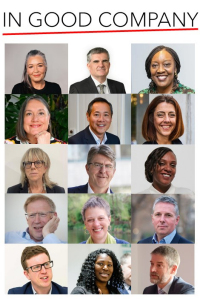
Over the last year or so, I seem to be having more and more of what I would call “existential conversations” with charity leaders.
Not existential in the sense of whether or not they will survive, although there have been one or two of those, but in the sense of what they are for, what the real purpose is that they exist to serve.
I suspect there are various reasons, not least because a decade ago, lots of charities had enjoyed years of rapid growth on the back of public sector contracts, but a decade later, most of those contracts are barely at the subsistence level – breakeven at best.
What began as a funding bonanza is rapidly becoming a fundraising nightmare with hospices among the first to feel the cliff-edge under their feet – a situation that certainly sharpens the mind.
Beyond that though, while a great many charities have still managed to grow their reach and their impact by finding new solutions and new sources of income, the gaps and the needs they’re trying to meet are all too often growing even faster.
For example, in this last decade, despite all our best efforts, homelessness has doubled. In the last year alone food poverty has tripled. And since 2012, food bank use has grown tenfold.
The portion of charities who can objectively look at their vision statements, of “a world in which…”, and hand-on-heart say that we’re significantly closer to that world than we were ten years ago, I suspect is depressingly small.
Hence these big existential conversations arising.
We all know the metaphor most often attributed to the late great Desmond Tutu: “There comes a point where we need to stop just pulling people out of the river. We need to go upstream and find out why they’re falling in.”
It’s a beautifully simple idea, but when pulling people out of the river is what we’re paid for, what most funders and donors think we’re primarily there to do, what scores of MPs and tabloid editors over recent years have excoriated us for stepping beyond, and what a great many trustees see as the safest place to play in a world in which managing risk is their most important job, well… it’s a challenge, isn’t it?
The thing is though, that these are, unfortunately, the challenging conversations we can no longer avoid having, because they speak to the funcamental questions of our time.
Are charities here simply to try to pull ever more people out of the river? To catch those falling through the gaps of an increasingly fraying system? To paper over the cracks of enduring, perhaps even growing societal failures?
Or are we here to attack the root causes as well, because if so, that raises more questions: How could we have any real impact upstream when the causes are so complex and interrelated? How would we fund it, lead it, and create strategies to achieve it?
And how could we sell it as a programme or even measure our success when it could take years, maybe decades to see the difference? And what happens if we fail?
You might be surprised (or not) to learn that plenty of charities have already found answers to many of those questions, because none of them are new, and a lot of individual organisations have been wrestling with different aspects of them for a long time.
I think it’s time more of us opened up those same existential conversations.
So, over the next few months, I will be talking with the leaders of some of those organisations, exploring what we’ve learned and what insights we can share, in a series of public conversations with (in my humble opinion) some of the best and most interesting leaders from across the sector.
You are welcome to join me live and listen in. And the recordings of the first few sessions are here if you want to catch up.
Whether you’re choosing to move upstream or specialise in service delivery or to pursue any of the many other routes that we’ll explore, I’m sure you’ll find plenty of useful stuff to take away.
Because one thing is for sure: if we don’t engage with these existential conversations and start trying some new approaches, in another decade we’ll be no closer to those visions being real than we are today.
